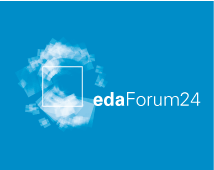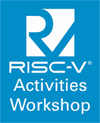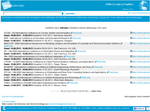A Cambrian Explosion in Electronic System Testing is Dead Ahead
Subhasish Mitra, U Stanford
Über den Vortrag:
Today's test technologies mostly serve 20th-century manufacturing needs of silicon CMOS chips. In this new decade, testing is going to change radically, driven by several factors:
(a) Today's test methods cannot meet the levels of thoroughness demanded by today's (and future) systems --- from (autonomous) cars to the cloud.
(a) Testing must grow beyond manufacturing defects to address robustness that end-users really care about: design bugs, reliability, and security.
(c) Future architectures, from chiplets to beyond-silicon NanoSystems, create new testing challenges.
These factors create golden opportunities for new "System-Driven" test approaches that address the above seemingly diverse problems at seemingly diverse scales. Testing will then become an essential 21st-century system feature rather than a cost burden defined by the constraints of 20th-century chip manufacturing.
Curriculum Vitae
 Subhasish Mitra is William E. Ayer Professor in the Department of Electrical Engineering and the Department of Computer Science at Stanford University. He directs the Stanford Robust Systems Group, leads the Computation Focus Area of the Stanford SystemX Alliance, and is a member of the Wu Tsai Neurosciences Institute. His research ranges across Robust Computing, NanoSystems, Electronic Design Automation (EDA), and Neurosciences. Results from his research group have influenced almost every contemporary electronic system, and have inspired significant government and research initiatives in multiple countries. He has held several international academic appointments — the Carnot Chair of Excellence in NanoSystems at CEA-LETI in France, Invited Professor at EPFL in Switzerland, and Visiting Professor at the University of Tokyo in Japan. Prof. Mitra also has consulted for major technology companies including Cisco, Google, Intel, Samsung, and Xilinx (now AMD).
Subhasish Mitra is William E. Ayer Professor in the Department of Electrical Engineering and the Department of Computer Science at Stanford University. He directs the Stanford Robust Systems Group, leads the Computation Focus Area of the Stanford SystemX Alliance, and is a member of the Wu Tsai Neurosciences Institute. His research ranges across Robust Computing, NanoSystems, Electronic Design Automation (EDA), and Neurosciences. Results from his research group have influenced almost every contemporary electronic system, and have inspired significant government and research initiatives in multiple countries. He has held several international academic appointments — the Carnot Chair of Excellence in NanoSystems at CEA-LETI in France, Invited Professor at EPFL in Switzerland, and Visiting Professor at the University of Tokyo in Japan. Prof. Mitra also has consulted for major technology companies including Cisco, Google, Intel, Samsung, and Xilinx (now AMD).
In the field of Robust Computing, he has created many key approaches for circuit failure prediction, on-line diagnostics, QED system validation, soft error resilience, and X-Compact test compression. Their adoption by industry is growing rapidly, in markets ranging from cloud computing to automotive systems. His X-Compact approach has proven essential for cost-effective manufacturing and high-quality testing of almost all 21st century systems, enabling billions of dollars in cost savings.
With his students and collaborators, he demonstrated the first carbon nanotube computer. They also demonstrated the first 3D NanoSystem with computation immersed in data storage. These received wide recognition: cover of NATURE, Research Highlight to the US Congress by the NSF, and highlight as "important scientific breakthrough" by global news organizations.
Prof. Mitra's honors include the Harry H. Goode Memorial Award (by the IEEE Computer Society for outstanding contributions in the information processing field), Newton Technical Impact Award in EDA (test-of-time honor by ACM SIGDA and IEEE CEDA), the University Researcher Award (by SIA and SRC to recognize lifetime research contributions), the Humboldt Research Award, the Intel Achievement Award (Intel’s highest honor), and the US Presidential Early Career Award from the White House. He and his students have published over 10 award-winning papers across 5 topic areas (technology, circuits, EDA, test, verification) at major venues including DAC, ISSCC, ITC, Symposia on VLSI, and Formal Methods in Computer-Aided Design. He is an ACM Fellow, an IEEE Fellow, and a foreign member of Academia Europaea.











